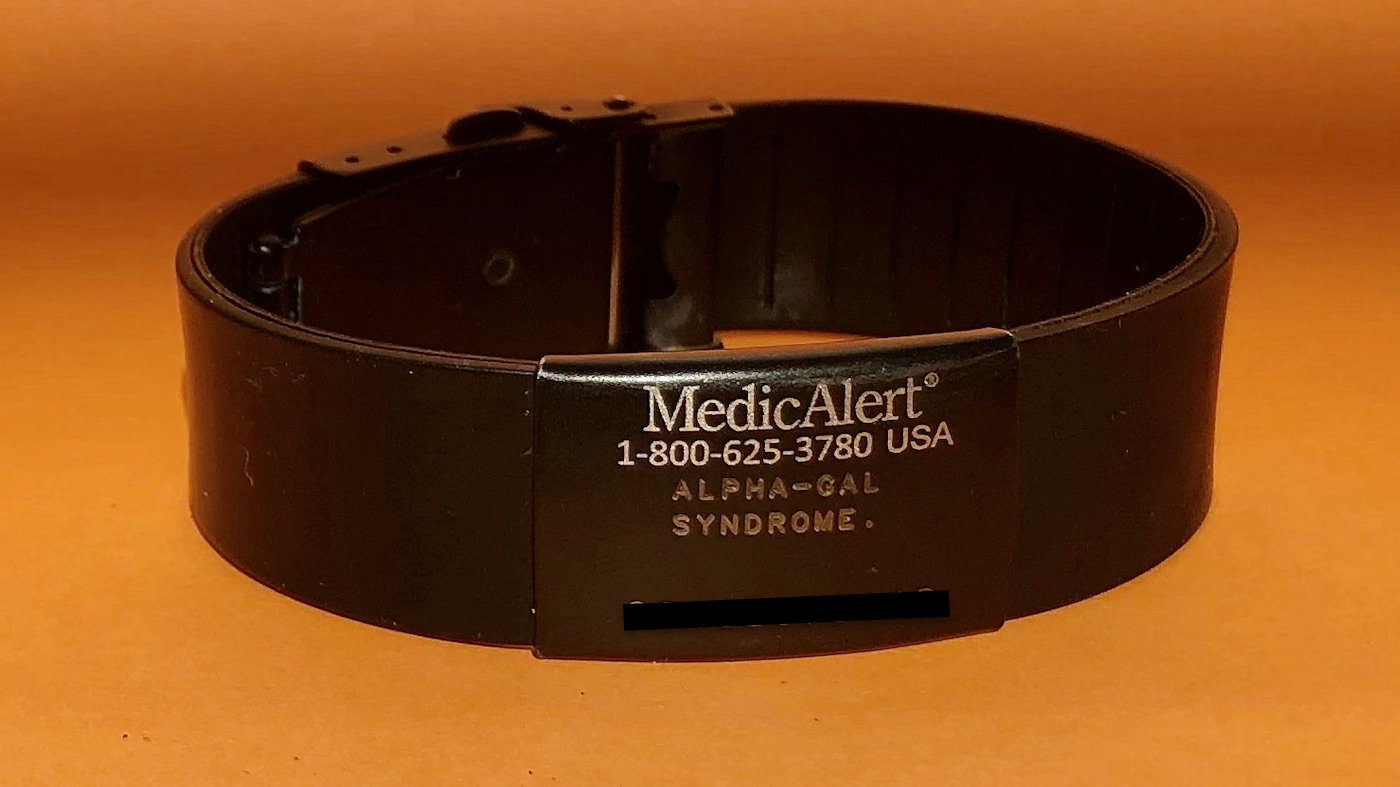Checklist for the Newly Diagnosed
Adjusting to Life with Alpha-gal Syndrome
Now what?!
Adjusting to life with AGS can be a big change.
Hang in there! You can do this!
It gets easier!
You are not alone; there is a whole community of people with AGS, and we are here to support you.
This list will help you get started.

Step #1: Stop eating mammalian meat
Many people with AGS can tolerate some mammalian products, like dairy, but virtually everyone with AGS needs to stop eating the mammalian products listed below, even if they have only had mild reactions, because:
- Reactions to alpha-gal are highly variable and dependent on cofactors. Therefore, a future reaction could be more serious.
- Alpha-gal syndrome is “an anytime allergy, not an every time allergy.”
- Up to 60% of people with AGS have anaphylactic reactions (1-4), and 30-40% of us experience cardiac symptoms.
Don’t play Russian roulette!
Some, but not necessarily all, foods to avoid include:
- The internal organs of mammals, like liver, heart, intestines (tripe or offal), lungs, and kidneys, which contain even more alpha-gal than meat
- Some people who don’t even react to meat have anaphylactic reactions after eating organs.
- Mammalian meats, like beef, pork, lamb, bison, venison, goat, horse, rabbit, squirrel, kangaroo, antelope, buffalo, camel, guinea pig, bats, whales, etc.
- If you aren’t sure which animals are mammals, there is a guide here.
- All other mammalian tissues, cells, and fluids, like brain, nerves, bones, skin, and blood
- Meat broths, bouillon, stocks, and gravy
- Meat flavorings, which are often just listed as “natural flavor”
- Meat extracts
- Mammalian gut sausage casings (turkey and chicken sausages often have these)
- Removing the casing and eating the sausage without it is not advised, as severe reactions have occurred from this practice.
- Animal fat, like lard, tallow, and suet are often in cooked foods, such as gravies, sauces, pastries, pie crusts, tortillas, refried beans, baked beans, vegetable dishes, mashed potatoes, and desserts added to fry oil to enhance flavor.
- Other products containing mammalian meat or organs
- Also, be cautious with high-fat dairy & large amounts of butter (57)
- Read labels!
- When eating out, you must ask about the mammalian content of anything you order. In particular, be sure to ask about gravies, sauces, stocks, and fry oil used to fry chicken, french fries, and other foods.
- It helps to have a card with information explaining which foods and ingredients you can’t eat to share with wait staff and chefs at restaurants. You can download one on this page.
Be aware that avoiding these products may not be enough. Many people with AGS react to other mammalian products like rennet, milk, dairy products, and gelatin. Some also react to mammalian byproducts and/or carrageenan in food, medications, medical products, personal care and household products. There are also accounts of people reacting to flounder eggs.
- See Food: First Steps for more information.

Step #2: Make an appointment with your doctor or allergist
Alpha-gal allergic reactions are often life-threatening. Make an appointment with a doctor to discuss how to manage AGS as soon as possible.
- If you have already experienced anaphylactic reactions, share this when you call to make your appointment.
- Many doctors are not familiar with AGS or have misconceptions about it. Print these papers and bring them with you:
- Dr. Scott Commins’s Diagnosis and Management fo Alpha-gal Syndrome: Lessons from 2,500 Patients
- Dr. Thomas Platts-Mills, et al. Diagnosis and management of patients with the α-Gal syndrome.
- Ask your doctor if they have access to Up-to-Date. If they do, recommend that they read Scott P. Commins, MD, PhD article, Allergy to Meats.
- If your doctor is open to learning more about AGS, encourage them to watch Dr. Scott Commins’ grand rounds presentation on alpha-gal syndrome.
- Talk to your doctor about your medications and supplements, whether they contain alpha-gal, and if they are safe for you. Many drugs, vaccines, and other medical products contain active or inactive ingredients derived from mammals.
- The alpha-gal content of pharmaceuticals and other medical products containing mammal-derived ingredients varies.
- Medical products can also contain carrageenan
- Some drugs that contain alpha-gal are riskier than others. You may need to avoid some, but tolerate others.
- It’s important to that you work with your doctors to weigh the risks and benefits of drugs that may contain alpha-gal.
- Always seek your doctor’s advice before starting, stopping, or changing medications.
- These papers may help your doctor understand issues related to alpha-gal in medication and medical products:
- What Does a Red Meat Allergy Have to Do with Anesthesia? Perioperative Management of Alpha-gal Syndrome
-
Perioperative implications of patients with alpha gal allergies
- Allergic response to medical products in patients with alpha-gal syndrome
- Drug Allergies Due to IgE Sensitization to α-Gal
- You can find more papers on AGS and allergies to medical products in the AGI Publications Database. Search using “pharm” or “perioperative”.
- If you, your pharmacist, or your doctor need help determining whether your medications are safe for you, VeganMed’s pharmacists can help. Reach the VeganMed pharmacists via:
- Live chat on www.veganmed.org or
- Email: info@veganmed.org
- Ask your doctor about any precautions you may need to take should you experience a medical emergency or require hospitalization or surgery. If they are not familiar with this issue, suggest they read the above papers.
- Talk to your doctor about airborne reactions to alpha-gal and how you should deal with them, should you experience them. Explain to your doctor that 10-15% of people with AGS report reacting to airborne alpha-gal (Scott Commins, personal communication); these reactions can be life-threatening.
- Ask your doctor if you need epinephrine autoinjectors (like EpiPens), and if so, how many.
- The overwhelming majority of people with AGS need epinephrine autoinjectors (EAIs) (Scott Commins, personal communication), due to the severity and variability reactions to alpha-gal.
- People who live or work in remote areas far from a hospital may need more than two EAIs.
- Bring a printed copy of FARE’s Food Allergy and Anaphylaxis Care Plan. Make sure that your doctor fills it in and that before you leave, you understand:
- How to manage mild reactions, like a few hives or mild GI symptoms
- How to manage severe reactions, like anaphylaxis
- How to differentiate between the two.

Step #3: Learn about anaphylaxis and epinephrine autoinjectors
The overwhelming majority of people with AGS need to carry epinephrine autoinjectors (like EpiPens)
- Up to 60% of patients with AGS have anaphylactic reactions (1-4).
- Alpha-gal allergy reactions are highly variable. This variability is a hallmark of AGS.
- Cofactors profoundly influence alpha-gal allergy reactions (see above).
- New tick bites can make you more reactive, and about half the time, people don’t notice that they were bitten by a tick.
- For all these reasons, even if you have had mild reactions in the past, you could have a more serious one in the future.
Epinephrine Autoinjectors
- There are different types of epinephrine autoinjectors. Generic epinephrine autoinjectors are substantially cheaper than EpiPens.
- One popular brand of epinephrine autoinjector is Auvi-Q. If you qualify, you can get up to 2 free Auvi-Q dual packs (that’s four autoinjectors in total) a year, delivered to your house. Your doctor will need to call in the prescription. For details, see this website.
- Your doctor should show you how to use your epinephrine autoinjectors when they give you your prescription.
- As soon as you get your prescription, take it to your pharmacy to be filled. There is often a shortage of epinephrine autoinjectors. It may take time for your pharmacy to fill your prescription.
- As soon as you have your epinephrine autoinjectors, review how to use them. Don’t wait until you have a reaction.
- This video shows how to use different brands of epinephrine autoinjectors.
- Keep your epinephrine autoinjectors with you at all times.
- Can’t afford an epinephrine autoinjector? Get help here.
Anaphylaxis Emergency Care Plans
- Your doctor should also create a Food Allergy & Anaphylaxis Emergency Care Plan for you that includes instructions on when to use your autoinjectors and explain it. Share the plan with your family and keep it with you.
- This is important. Ask for the care plan. If your doctor didn’t give you one at your appointment, contact them and ask for one.
Educate yourself about anaphylaxis
- The anaphylaxis section of the FARE website is a good place to start.
- This article, All About Epinephrine: What It Does in a Reaction, How Long It Lasts, When It Gets Hot or Cold will answer many of your questions about the use of epinephrine autoinjectors.
- This video presentation about anaphylaxis and the use of epinephrine autoinjectors, featuring prominent allergist Jonathan Spergel, is packed full of information. Everyone who has anaphylactic reactions should watch it. You will feel well-informed and more confident about taking control of your reactions if you do. Click here.
- Take this short course about Recognizing and Responding to Anaphylaxis and ask your loved ones to take it, too.
NEW PROTOCOLS FOR USE OF EPINEPHRINE AUTOINJECTORS DURING THE COVID-19 PANDEMIC CLICK HERE

Step #4: Create an emergency kit
Seek your physician’s advice about the contents of your personalized emergency kit. You might want to include:
A bag to keep the kit in
- Many people like to keep their kit in a brightly colored, well-labeled bag or backpack that will be hard to overlook in an emergency.
- Add a tag to your bag indicating that you keep your epinephrine autoinjector in it.
Medications
- However many epinephrine autoinjectors that your doctor thinks you should keep with you, in a bright, insulated bag, like this one
- Whichever antihistamines, inhalers, steroids, and other medications your doctor recommends you keep with you
Mask, if needed
- An N99 mask, if you react to airborne particles and your doctor recommends one. Many people with AGS like Cambridge Masks.
Your information
- Your Anaphylaxis Emergency Care Plan
- Your medical information, including any medical history that might be relevant to your medical care
- Contact information for your emergency contact and allergist and/or primary care provider
- Your medical power of attorney, in case you are unconscious when you arrive at the hospital
AGS information
- AGS information–consider printing and carrying these papers with you, or add a link to them in your RoadID or MedicAlert file:
Don’t forget about ticks!
- If you expect to be in an area with ticks, include a magnifying glass, something to remove ticks with. If you choose to send any ticks you remove to a lab to be identified and/or tested for tick-borne disease-causing pathogens, then also something to store the removed ticks in– like tape and a plastic bag.
More ideas
- In the video “My Alpha Gal Emergency Kit”, a person with AGS explains what they keep in their emergency kit and why.
Keep your emergency kit with you at all times! Due to the delayed nature of alpha-gal reactions, you don’t know when you might need it.

Step #5: Beware of airborne alpha-gal
There are no published data on the percentage of people with alpha-gal syndrome (AGS) who react after exposure to airborne alpha-gal, but the informal estimates of experts range from 10-30%. People with AGS who react to airborne alpha-gal report that reactions often start within minutes of exposure, progress quickly, and can be severe.
- Suspended droplets and aerosols of fat in smoke or fumes from cooking meat, especially from grills, barbeques, and sometimes frying meat, are by far the most commonly reported airborne trigger of alpha-gal reactions.
- Until you know whether you react to airborne alpha-gal, exercise caution around possible sources of exposure, especially barbecues and other types of cooking that generate aerosolized mammalian fat.
- If you experience dizziness, breathing difficulties, or other symptoms, remove yourself immediately from the source of exposure!
- Some people with AGS report that fume reactions are the most dangerous reactions that they experience, leading rapidly to anaphylaxis, airway issues, and/or unconsciousness.
For more information about reactions to airborne alpha-gal, including reported symptoms other sources of airborne alpha-gal that may trigger reactions, see Reactions to Airborne Alpha-gal.

Step #6: Learn about cofactors
Cofactors are conditions that can change how people respond to an allergen, lowering the threshold at which they react. Cofactors play an important role in alpha-gal allergic reactions. For example, if you have a glass of wine with dinner or go jogging after lunch, you are more likely to react any alpha-gal you consumed during your meal. Some cofactors include:
- Alcohol consumption
- Exercise
- The use of NSAIDs (like Advil)
- ACE inhibitors/β-agonists
- Illness, infection
- Stress
- Lack of sleep
- Menstruation
Alcohol consumption and exercise are especially important cofactors.
Tick bites aren’t cofactors, but new tick bites can also make reactions more severe.

Step #7: Buy a medical information bracelet
- Many people with AGS like Road ID, because you can put several lines of information on it.
- Medic Alert is another option.
- Ideas about what to include on medical alert bracelets vary from person to person. Seek your physician’s advice.
- Information that many people share includes:
- Alpha-gal Syndrome (mammalian allergy)
- Allergic to mammalian products and byproducts, including heparin, gelatin-based plasma substitutes such as Gelofusin, and other medications.
- Anaphylaxis
- EpiPen in bag
- ICE 555.555.5555 (your emergency contact’s phone number).
- Medical info in wallet/bag (if you have a medical card with info in your wallet or bag).
- Remember to add medical information to your associated online account, too.

Step #8: Enter medical information on your phone
- Many first responders know to check for this.
- If you have an iPhone, you can put medical information in the iPhone Health app, which comes with your phone.
- If you have an Android phone, you can get the Medical ID app.
- You can also create a lock screen on your phone with medical information on it.
- Ideas about what to include on your phone vary from person to person. Seek your physician’s advice.

Step #9: See an expert
If you can, make an appointment with an allergist with expertise in AGS, even if you have to travel to see them. Many patients highly recommend Dr. Scott Commins at UNC and Dr. Jeffrey Wilson or Dr. Thomas Platts-Mills at UVA.
If you don’t live near an expert, find a local allergist with some knowledge of AGS. You may need someone local in an emergency, even if you have seen an expert. If you can’t find a local provider who understands AGS, don’t despair: find a doctor open to learning with you. There are now two excellent papers about the diagnosis and management of patients with AGS (see step #2) that can quickly get any physician willing to read them up to speed.

Step #10: If you are depressed, get help
- Read about symptoms of depression on the WebMD website.
- Read Psychological Impacts of Living with Alpha-gal Syndrome by Dr. Paige Freeman on the Two Alpha Gals website.
- If you think you might be depressed, make an appointment with a counselor.
- The Food Allergy Counselor Directory and Website has a list of counselors who specialize in helping people with allergies. These FAC counselors are familiar with AGS. There may be others, too:
- Dr. Paige Freeman —an alpha-gal informed psychologist with a clinical focus in the treatment of anxiety, including food allergy stressors.
-
Phone: 516-375-3645

Step #11: Figure out your alpha-gal tolerance level
Learn about symptoms
Before you try to figure out your personal tolerance level for alpha-gal make sure you understand the full range of symptoms that AGS can be associated with.
People often find that GI issues, arthritis, fibromyalgia, migraines, and other symptoms that they have suffered from for years clear up once they have settled into an appropriate avoidance diet. This sometimes involves removing more than red meat from their diet.
Figure out your tolerance levels
- Learn about alpha-gal tolerance levels and figure out yours using Alpha-gal Tolerance Levels (coming soon!) for guidance.
- Then make the necessary changes to your diet, medications (with the advice of a physician), and environment.
See Determining Your Tolerance to Alpha-gal: First Steps for more information.

Step #12: Avoid new tick bites and bee stings
- Additional tick bites can resensitize you to alpha-gal and make your reactions worse.
- Bee, wasp, and hornet stings may also lead to increased alpha-gal IgE.
- Consider buying some socks and other clothing from Insect Shield or have them treat some of your own clothes.
- See Avoiding Tick Bites
*The owner of this website does NOT benefit in any way from endorsing Insect Shield or any other company. The only reason we ever recommend a company is because we like their products.

Photo credit: Amaroo Hills Emu Farm
Step #13: Try emu, ostrich, GalSafe pork, and other great red meat alternatives
Emu and ostrich
If you eat meat, try emu or ostrich. Many people with AGS find that emu or ostrich makes an excellent substitute for beef.
- Emu and ostrich look and taste like beef. Many people can’t tell the difference.
- Emu is high in iron and low in saturated fats.
- In the U.S., many people with AGS order emu and ostrich from Amaroo Hills Emu Farm.
- One of the owners of this farm has AGS, and they are careful to avoid cross-contamination.
- Their meats are top quality and served in high-end restaurants across the country.
- They also make excellent duck products.
Galsafe Pork
Revivicor has created a special genetically-modified pig that does not make alpha-gal, called the GalSafe pig. Limited quantities of GalSafe pork products are available through Amaroo Hills Emu Farm.
Please remember that other pork is NOT safe for you! GalSafe pigs are very special, genetically modified pigs.
Duck, chicken, and turkey bacon.
An excellent substitute for pork bacon is duck, chicken, or turkey bacon.
- D’Artagnan Duck Bacon is popular in the alpha-gal community.
- If you are sensitive to alpha-gal, you may want to avoid Oscar Mayer turkey bacon, which is made on the same line as their pork bacon.
Turkey hotdogs
Sausages
- Make sure poultry sausages do NOT have mammalian gut or collagen casings.
- Some popular casing-free poultry sausages include:
- Applegate Chicken and Sage Breakfast Sausages
- Amaroo Hills Duck Breakfast Sausage (maple or regular)
- Amaroo Hills Duck Italian Sausage (spicy, sweet, and mild)
- Amaroo Hills Duck Chorizo
Turkey ham
More suggestions
- Find more red meat alternatives here.
*The owner of this website does NOT benefit in any way from recommending any brands or companies. We do NOT accept gifts, discounts, or anything else from companies mentioned on this website. We only ever recommend a brand because we like it or it is popular with others in the alpha-gal community.

Step #14: Consider working with a dietitian
Some people have difficulty adjusting to an AGS diet, especially if they are highly reactive, have dietary restrictions, or travel for work. If you struggle to adjust to your new diet, consider working with a dietitian or nutritionist.
- A dietitian is certified by the Academy of Nutrition and Dietetics.
- A nutritionist is not always certified.
- Ask your allergist or primary care physician to refer you to a dietitian or nutritionist.
- If possible, find one with an understanding of AGS.

Step #15: Seek support
The alpha-gal community is warm and supportive. You don’t need to go through this alone! Some ways to find support include:
- Join the Alpha-gal Information: Evidence-Based Support Facebook group
- Find a local or special interest alpha-gal syndrome support group. There are over 100! You can find them in our AGS Facebook Support group databases.
Resources for the Newly Diagnosed
Anaphylaxis
Epinephrine autoinjectors
Medical information bracelets and apps
Medic Alert
Medical information bracelets
Road ID
Medical information bracelets
Medical ID for Android
Put your medical information on your Android phone
Depression and counseling
References–in development
1. van Nunen S, O’Connor K, Fernando S, Clarke L, Boyle R. THE ASSOCIATION BETWEEN IXODES HOLOCYCLUS TICK BITE REACTIONS AND RED MEAT ALLERGY: P17. Internal Medicine Journal. 2007 Nov 1;37.
2. Van Nunen SA, O’Connor KS, Clarke LR, Boyle RX, Fernando SL. An association between tick bite reactions and red meat allergy in humans. The Medical journal of Australia. 2009 May 4;190(9):510-1.
3. van Nunen S. Galactose-alpha-1, 3-galactose, mammalian meat and anaphylaxis: a world-wide phenomenon?. Current Treatment Options in Allergy. 2014 Sep 1;1(3):262-77.
4. van Nunen S. Tick-induced allergies: mammalian meat allergy, tick anaphylaxis and their significance. Asia Pacific Allergy. 2015 Jan 1;5(1):3-16.
All the information on alphagalinformation.org is provided in good faith, but we, the creators and authors of the Alpha-gal Information website offer no representation or warranty, explicit or implied, of the accuracy, adequacy, validity, reliability, availability, or completeness of any information on this site. Under no circumstances should we have any liability for any loss or damage incurred by you as a result of relying on information provided here. We are not physicians or medical professionals, researchers, or experts of any kind. Information provided in this website may contain errors and should be confirmed by a physician. Information provided here is not medical advice. It should not be relied upon for decisions about diagnosis, treatment, diet, food choice, nutrition, or any other health or medical decisions. For advice about health or medical decisions including, but not limited to, diagnosis, treatment, diet, and health care consult a physician.
READ FULL DISCLAIMER>
